初英考点精讲 同课异构 114 邀请和应答【知识点微课课件】
文档属性
| 名称 | 初英考点精讲 同课异构 114 邀请和应答【知识点微课课件】 | 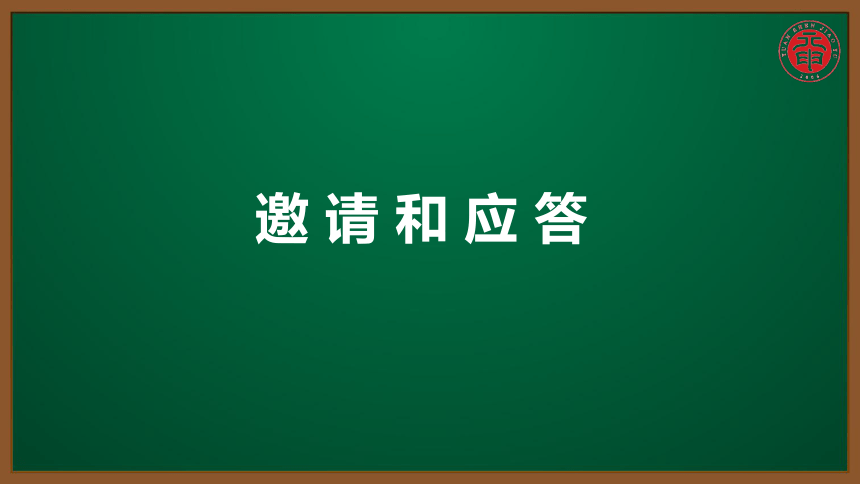 | |
| 格式 | ppt | ||
| 文件大小 | 415.0KB | ||
| 资源类型 | 试卷 | ||
| 版本资源 | 通用版 | ||
| 科目 | 英语 | ||
| 更新时间 | 2021-07-15 11:33:23 | ||
图片预览

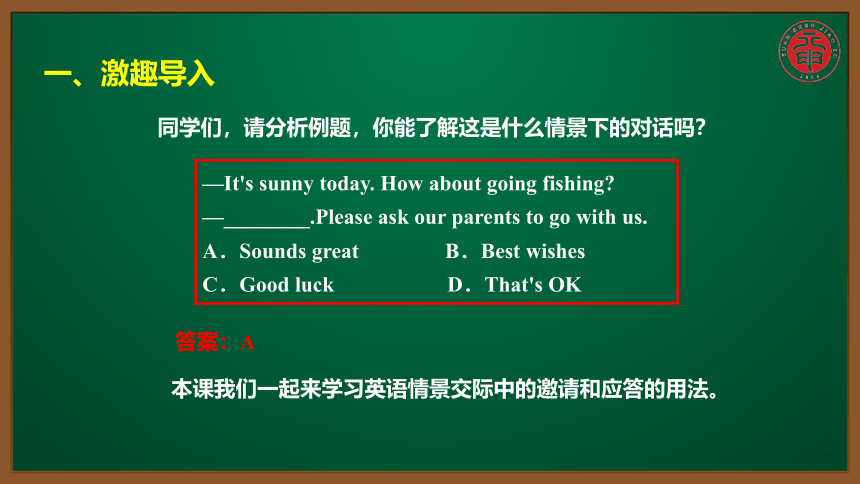
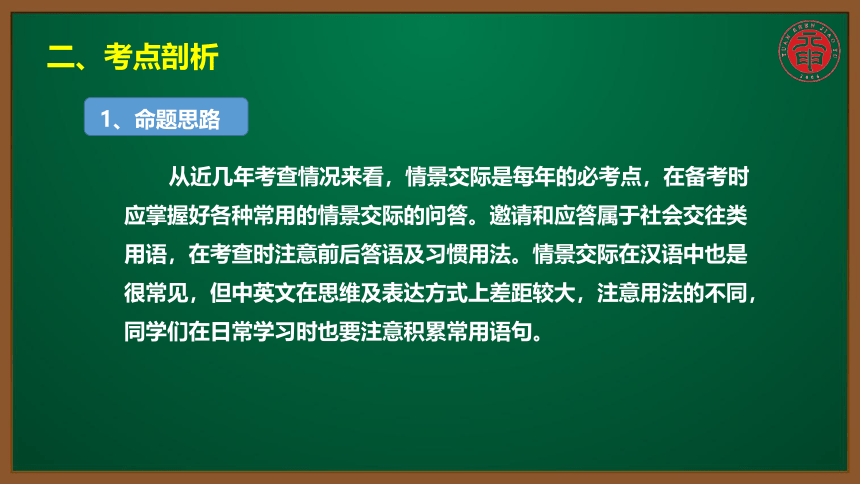
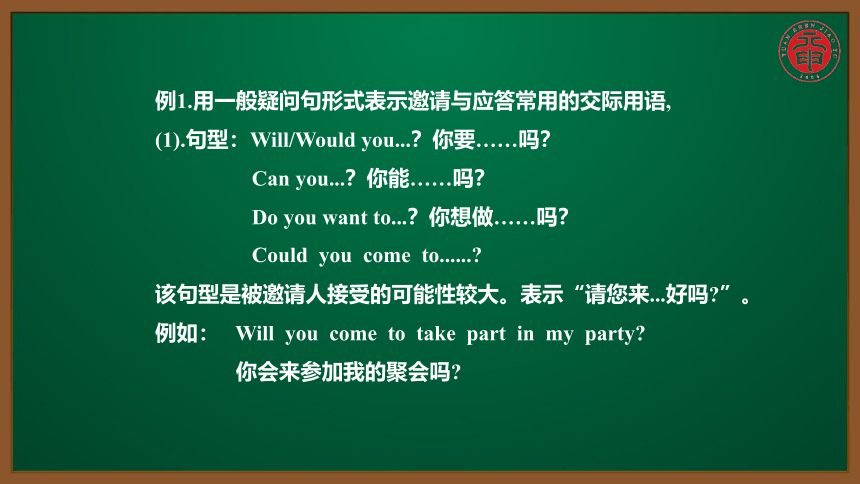
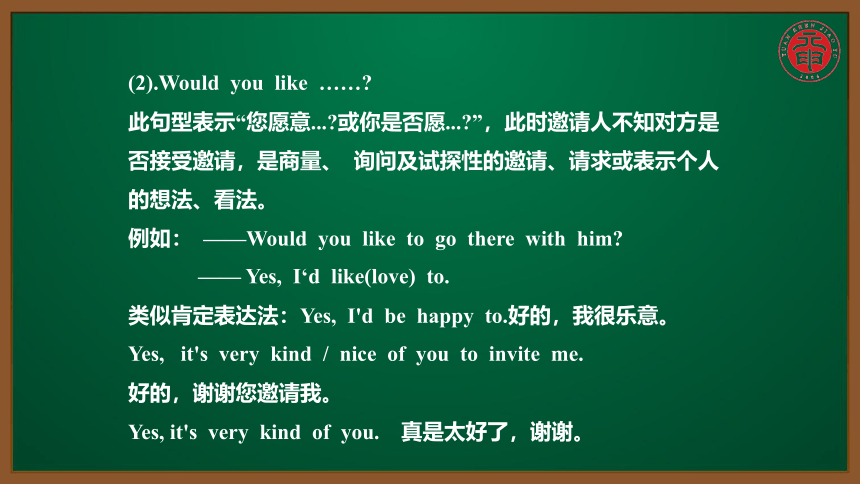
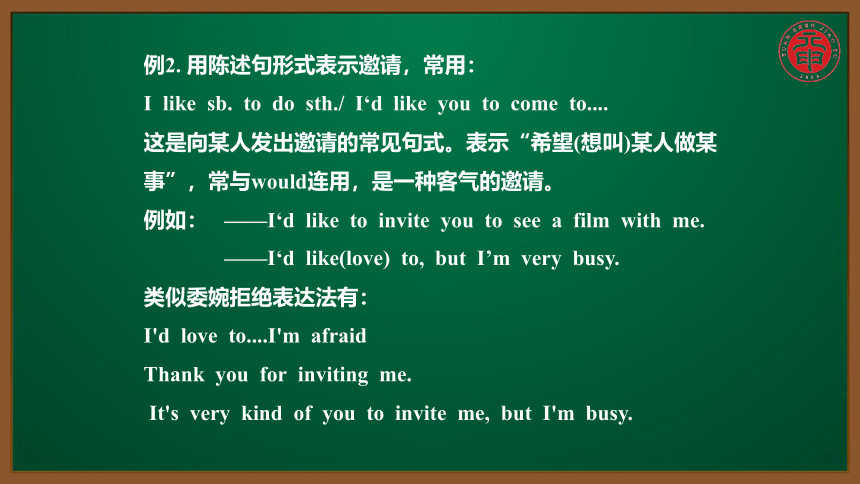
文档简介
邀 请 和 应 答
一、激趣导入
同学们,请分析例题,你能了解这是什么情景下的对话吗?
—It's sunny today. How about going fishing?
—________.Please ask our parents to go with us.
A.Sounds great B.Best wishes
C.Good luck D.That's OK
本课我们一起来学习英语情景交际中的邀请和应答的用法。
答案:A
二、考点剖析
1、命题思路
从近几年考查情况来看,情景交际是每年的必考点,在备考时应掌握好各种常用的情景交际的问答。邀请和应答属于社会交往类用语,在考查时注意前后答语及习惯用法。情景交际在汉语中也是很常见,但中英文在思维及表达方式上差距较大,注意用法的不同,同学们在日常学习时也要注意积累常用语句。
例1.用一般疑问句形式表示邀请与应答常用的交际用语,
(1).句型:Will/Would you...?你要……吗?
Can you...?你能……吗?
Do you want to...?你想做……吗?
Could?you?come?to......?
该句型是被邀请人接受的可能性较大。表示“请您来...好吗?”。
例如:? Will?you?come?to?take?part?in?my?party??
你会来参加我的聚会吗?
(2).Would?you?like?……????
此句型表示“您愿意...?或你是否愿...?”,此时邀请人不知对方是否接受邀请,是商量、 询问及试探性的邀请、请求或表示个人的想法、看法。??
例如:?——Would?you?like?to?go?there?with?him???
—— Yes,?I‘d?like(love)?to.
类似肯定表达法:Yes,?I'd?be?happy?to.好的,我很乐意。
Yes,? it's?very?kind?/?nice?of?you?to?invite?me.??
好的,谢谢您邀请我。
Yes, it's?very?kind?of?you.??真是太好了,谢谢。
例2. 用陈述句形式表示邀请,常用:
I?like?sb.?to?do?sth./?I‘d?like?you?to?come?to....
这是向某人发出邀请的常见句式。表示“希望(想叫)某人做某事”,常与would连用,是一种客气的邀请。??
例如:? ——I‘d?like?to?invite?you?to?see?a?film?with?me.
——I‘d?like(love)?to,?but?I’m?very?busy.
类似委婉拒绝表达法有:
I'd?love?to....I'm?afraid
Thank?you?for?inviting?me.
It's?very?kind?of?you?to?invite?me,?but?I'm?busy.
1. —Would you like to see a film with me?
—________ But I'm busy revising for my test.
A.Don't mention it. B.I'd love to. C.That's all right. D.My pleasure.
2. . —Will you be back before 10 o’clock?
— _________. The exam won’t be over until eleven.
I hope not B. Here you are C. I’m afraid not D. Best wishes
3. —Would you like to watch the movie Dangal(《摔跤吧,爸爸!》) after school? —________. I have to look after my sister.
A. Enjoy yourself B. No problem C. I'm afraid not D. It takes no time
练习一:单项选择,请选出正确的答案.
2、练一练
C
C
B
4.?—Jeff, could you tell me how to take a taxi through “Didi”?
—________.
You're welcome B. Sure, I'd love to C. Take it easy D. It doesn't matter
5. —Would you like to go to a movie with us, Sandy?
—________. I have lots of homework to do.
No problem B. I'm afraid not C. I'd love to D. Yes, please
6. —Tomorrow is Saturday. Would you like to go cycling with me?
— ______。
A. I like it very much. B. Yes, I would. C. Sure, I'd love to. D. I think so.
B
B
C
A: Hi. Suian. What movie are you watching tonight?
B: 1 Its my second time watching it.
A: Man on Wire. . . Hmm. . .
B: 2 .
A: Yeah, I do. It’s a great movie.
B: I agree. 3 .
A: Oh, I remember. And it was in New York. I love that city.
B: Me, too. 4 .
A: I’d love to, but I have to stay at home with my mom. 5 .
B: Sorry to hear that. Hope your mom will be better soon.
A: Thanks. Enjoy your night.
练习二、根据情景补充对话。
A. How about you?
B. Do you know it?
C. Why do you say that?
D. It’s called Man on Wire.
E. She is ill in bed.
F. The man in the movie was really brave.
G. Would you like to watch the movie with me?
解析:快速浏览对话可知对话大意:先询问今晚看什么电影展开对话,然后谈论该电影,邀请对方一起去看电影,对方因应在家照看卧病在床的母亲而婉言拒绝。
1. 【解析】选D。回答上文提出的问题,给出电影名字——Man on Wire(《走钢丝的人》)。
2. 【解析】选B。由下文的肯定回答及评论可知。
3. 【解析】选F。承接对方谈论内容,继续对该电影作出评论。
4. 【解析】选G。由答语“I’d love to, but. . . ”可知此处是向对方发出邀请。
5. 【解析】选E。由上下文可知是母亲卧病在床。
3、答题技巧
仔细审题,读懂句意或对话表达的意思和情景。
分析句子和对话,根据具体语境和上下文句法关系寻找答案。
依据西方国家的文化背景、语言表达和习惯寻找答案。
有时有些题空的答案不仅是由上下文内容决定的,因此完成题目后,把整篇对话从头到尾再通读一遍,看是否连贯、通顺、及时加以修正也是非常必要的。
三、思维导图
一、激趣导入
同学们,请分析例题,你能了解这是什么情景下的对话吗?
—It's sunny today. How about going fishing?
—________.Please ask our parents to go with us.
A.Sounds great B.Best wishes
C.Good luck D.That's OK
本课我们一起来学习英语情景交际中的邀请和应答的用法。
答案:A
二、考点剖析
1、命题思路
从近几年考查情况来看,情景交际是每年的必考点,在备考时应掌握好各种常用的情景交际的问答。邀请和应答属于社会交往类用语,在考查时注意前后答语及习惯用法。情景交际在汉语中也是很常见,但中英文在思维及表达方式上差距较大,注意用法的不同,同学们在日常学习时也要注意积累常用语句。
例1.用一般疑问句形式表示邀请与应答常用的交际用语,
(1).句型:Will/Would you...?你要……吗?
Can you...?你能……吗?
Do you want to...?你想做……吗?
Could?you?come?to......?
该句型是被邀请人接受的可能性较大。表示“请您来...好吗?”。
例如:? Will?you?come?to?take?part?in?my?party??
你会来参加我的聚会吗?
(2).Would?you?like?……????
此句型表示“您愿意...?或你是否愿...?”,此时邀请人不知对方是否接受邀请,是商量、 询问及试探性的邀请、请求或表示个人的想法、看法。??
例如:?——Would?you?like?to?go?there?with?him???
—— Yes,?I‘d?like(love)?to.
类似肯定表达法:Yes,?I'd?be?happy?to.好的,我很乐意。
Yes,? it's?very?kind?/?nice?of?you?to?invite?me.??
好的,谢谢您邀请我。
Yes, it's?very?kind?of?you.??真是太好了,谢谢。
例2. 用陈述句形式表示邀请,常用:
I?like?sb.?to?do?sth./?I‘d?like?you?to?come?to....
这是向某人发出邀请的常见句式。表示“希望(想叫)某人做某事”,常与would连用,是一种客气的邀请。??
例如:? ——I‘d?like?to?invite?you?to?see?a?film?with?me.
——I‘d?like(love)?to,?but?I’m?very?busy.
类似委婉拒绝表达法有:
I'd?love?to....I'm?afraid
Thank?you?for?inviting?me.
It's?very?kind?of?you?to?invite?me,?but?I'm?busy.
1. —Would you like to see a film with me?
—________ But I'm busy revising for my test.
A.Don't mention it. B.I'd love to. C.That's all right. D.My pleasure.
2. . —Will you be back before 10 o’clock?
— _________. The exam won’t be over until eleven.
I hope not B. Here you are C. I’m afraid not D. Best wishes
3. —Would you like to watch the movie Dangal(《摔跤吧,爸爸!》) after school? —________. I have to look after my sister.
A. Enjoy yourself B. No problem C. I'm afraid not D. It takes no time
练习一:单项选择,请选出正确的答案.
2、练一练
C
C
B
4.?—Jeff, could you tell me how to take a taxi through “Didi”?
—________.
You're welcome B. Sure, I'd love to C. Take it easy D. It doesn't matter
5. —Would you like to go to a movie with us, Sandy?
—________. I have lots of homework to do.
No problem B. I'm afraid not C. I'd love to D. Yes, please
6. —Tomorrow is Saturday. Would you like to go cycling with me?
— ______。
A. I like it very much. B. Yes, I would. C. Sure, I'd love to. D. I think so.
B
B
C
A: Hi. Suian. What movie are you watching tonight?
B: 1 Its my second time watching it.
A: Man on Wire. . . Hmm. . .
B: 2 .
A: Yeah, I do. It’s a great movie.
B: I agree. 3 .
A: Oh, I remember. And it was in New York. I love that city.
B: Me, too. 4 .
A: I’d love to, but I have to stay at home with my mom. 5 .
B: Sorry to hear that. Hope your mom will be better soon.
A: Thanks. Enjoy your night.
练习二、根据情景补充对话。
A. How about you?
B. Do you know it?
C. Why do you say that?
D. It’s called Man on Wire.
E. She is ill in bed.
F. The man in the movie was really brave.
G. Would you like to watch the movie with me?
解析:快速浏览对话可知对话大意:先询问今晚看什么电影展开对话,然后谈论该电影,邀请对方一起去看电影,对方因应在家照看卧病在床的母亲而婉言拒绝。
1. 【解析】选D。回答上文提出的问题,给出电影名字——Man on Wire(《走钢丝的人》)。
2. 【解析】选B。由下文的肯定回答及评论可知。
3. 【解析】选F。承接对方谈论内容,继续对该电影作出评论。
4. 【解析】选G。由答语“I’d love to, but. . . ”可知此处是向对方发出邀请。
5. 【解析】选E。由上下文可知是母亲卧病在床。
3、答题技巧
仔细审题,读懂句意或对话表达的意思和情景。
分析句子和对话,根据具体语境和上下文句法关系寻找答案。
依据西方国家的文化背景、语言表达和习惯寻找答案。
有时有些题空的答案不仅是由上下文内容决定的,因此完成题目后,把整篇对话从头到尾再通读一遍,看是否连贯、通顺、及时加以修正也是非常必要的。
三、思维导图
同课章节目录
- 词法
- 名词
- 动词和动词短语
- 动词语态
- 动词时态
- 助动词和情态动词
- 非谓语动词
- 冠词
- 代词
- 数词和量词
- 形容词副词及其比较等级
- 介词和介词短语
- 连词和感叹词
- 构词法
- 相似、相近词比较
- 句法
- 陈述句
- 一般疑问句和否定疑问句
- 特殊疑问句及选择疑问句
- 反意疑问句
- 存在句(There be句型)
- 宾语从句
- 定语从句
- 状语从句
- 主谓一致问题
- 简单句
- 并列句
- 复合句
- 主谓一致
- 主、表语从句
- 名词性从句
- 直接引语和间接引语
- 虚拟语气
- 感叹句
- 强调句
- 倒装句
- 祈使句
- 句子的成分
- 句子的分类
- 题型专区
- 单项选择部分
- 易错题
- 完形填空
- 阅读理解
- 词汇练习
- 听说训练
- 句型转换
- 补全对话
- 短文改错
- 翻译
- 书面表达
- 任务型阅读
- 语法填空
- 其他资料
